Our Solutions Help To Simplify V Cycle Of Automotive Development Process
- By Sharad P Matade
- June 22, 2021
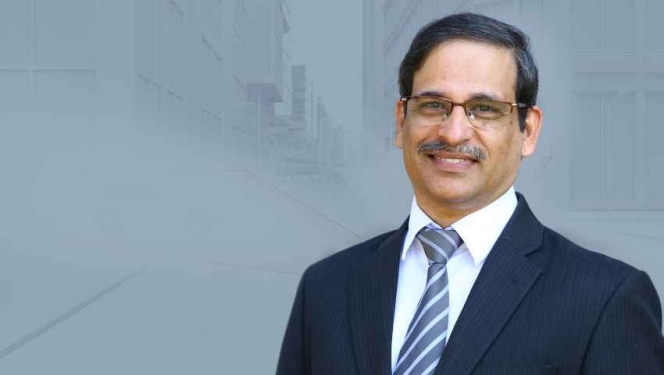
Over the last three decades, Vector has been supplying tools and services that give engineers the decisive advantage to make challenging and highly complex designs and develop automotive products as simple and manageable as possible. Today, the company is working on various fronts from e-mobility to connectivity, cyber security to ADAS and will continue to work on the new areas which will drive the future of mobility. “Vector is also working on identifying the challenges that a customer could face in the future in the context of these trends and is working as a partner with the customers to overcome these challenges,” said Chandra Nataraja, Managing Director, Vector Informatik India. Nataraja also emphasises the need of ‘real R&D development’ at the local level in India, instead of being followers and adapters.

Q) We are coming across the word “complexity” often in the automotive industry? How does Vector help in simplifying the process in engineering, design, testing, validation and calibration?
Chandra Nataraja: At Vector Informatik, more than 3,000 employees across 31 locations worldwide support manufacturers and suppliers of the automotive industry with a professional platform of tools and software components. Our solutions are used by engineers of automotive OEMs, Tier-1 suppliers and other software organisations undertaking the development of automotive electronics.
There is increased complexity in the automotive space, especially with the software running in cars, for which development teams need to have an overview of their ideas being realised into technologies. There is a lot of toolchain and structure development, not to mention the standards that are being adopted. Vector is a part of several standardisation groups and offers solutions across the complete V cycle of automotive development process, including system engineering, design, testing, validation and calibration, which helps to simplify the processes for the customers.
To elaborate further, the ECU testing tools from Vector support in the implementation of simulation and test environments in an efficient way. Regardless of the task in the development process, the Vector testing tools provide a scalable and re-usable solution from pure SIL simulations to HIL testing with functional acceptance tests – for all types of vehicles including internal combustion engine, a hybrid or a purely electric vehicle. Similarly, for calibration, we provide software and hardware solutions which cover all requirements throughout the entire development process, right from function development through bypassing and rapid prototyping solutions to test bench applications and test drives during trials and in series production.
We also offer solutions to engineers in other application areas such as advanced driver assistance systems (ADAS), autonomous driving, connected vehicles and electric vehicles. The company puts together solutions and provides customers with toolchain to develop, test, calibrate and validate software that is being developed for such applications.
Q) What are the current trends in the automotive industry for which the company is developing solutions?
Chandra Nataraja: Vector follows automotive trends closely, with the principle for the company being that it does not develop solutions in isolation, but rather works with customers as partners.
E-mobility is one of the major trends today and for electric mobility to enter mass market, smart charging is a key solution. The term smart charging is used for charging systems of electric or hybrid vehicles according to various standards like ISO 15118, DIN SPEC 70121 and SAE J2847/2. Vector supports developers of on-board charging ECUs in the vehicle, charging stations and induction charging systems with extensive test systems and bespoke ECU software. Using Vector test solution for smart charging, customers can test on-board charging ECUs without having to operate a real charging spot. Vector also offers solutions for testing of charging stations, E-Mobility Measurement and software stack for rapid development of charging ECUs, which supports all international standards including CCS, GB/T and CHAdeMO. This helps customers develop their software quickly and cost effectively.
 Another area of focus is connected vehicles, where Vector is looking at extending the domain beyond the car, at the areas where it can offer standardisation. There is a large amount of data collected from the car when talking about connectivity, and the company is looking at cloud solutions in managing this data.
Another area of focus is connected vehicles, where Vector is looking at extending the domain beyond the car, at the areas where it can offer standardisation. There is a large amount of data collected from the car when talking about connectivity, and the company is looking at cloud solutions in managing this data.
This also brings us to cyber security, where OEMs and applied partners are analysing if there is enough security of information inside the automobile. Vector has developed solutions related to remote updating of software, for which its understanding of the vehicle network is helping us to see how this can be connected with the IT world.
Autonomous Driving is another trend towards which Vector is carrying out development work, in partnership with BASELABS. BASELABS has algorithms related to ADAS for autonomous driving, and with Vector’s calibration product line aligned to it, we have an entire package which supports both the development and validation of ADAS.
Our tool set for testing and calibration has been developed to accommodate future vehicle technologies, and also extend it to multiple networks in the vehicle. Apart from developing innovations based on market trends, Vector is also working on identifying the challenges that a customer could face in the future in the context of these trends and is working as a partner with the customers to overcome these challenges.
Q) With the growing penetration of electronics in vehicles, how do you see the business opportunities for the company?
Chandra Nataraja: Since last 30 years, Vector has been a capable partner in the development of automotive electronics. Satisfied and successful customers are our motivation, and we work to ensure that our customers achieve an increase in value in their work that we can also be proud of. Driven by our passion for technology, we develop solutions which relieve engineers of their demanding tasks and our focus continues to be on providing products to customers for developing embedded systems so that they can develop solutions which will drive the future of mobility.
We see the business opportunities increasing with our existing customers as they look towards future challenges and opportunities. Also, the current trends have brought in new technology players in the automotive ecosystem, and we look forward to working with them as their reliable and technically competent partner.
Q) How do you see the collaborative approach, especially with high-tech companies?
Chandra Nataraja: Presently, we are already collaborating with multiple high-tech companies in Europe and USA. We do see the potential to collaborate with Indian Tier-1s, Tier-2s and service organisations, especially in the EV space. India is poised to develop a unique ecosystem within the electric vehicle segment where all these companies will play a key role, and we look forward to working as partners with everyone who will develop the future of mobility.
We continue to explore synergies with agile companies and our technology, which can be seen in our efforts to foray into areas other than automotive where we can add value as partner to customers and collaborate to develop technology solutions.
 Q) What is the role of the Indian entity in Vector’s global business?
Q) What is the role of the Indian entity in Vector’s global business?
Chandra Nataraja: Vector Informatik India Private Limited is a 100 percent subsidiary of Vector Informatik GmbH and is headquartered at Pune with offices in Bengaluru, where more than 100 technical experts and subject matter specialists support the customers in automotive ecosystem with their challenges and provide customised solutions as per their development and testing needs.
We work closely with all global and local customers based in India, those who have technical teams and presence in India – to understand their development needs and provide solutions across application areas. Dedicated support team in India is available to the customers for all technical queries’ resolution, while we also facilitate the training needs of the customer locally. We also have a test services team which supports the customers with their customised project requirements related to test systems.
Q) What significance does AUTOSAR have for Vector?
Chandra Nataraja: We see that AUTOSAR is a standard that is widely adopted across the globe and the automotive market in India has also seen good adaptation towards AUTOSAR.
Vector has many years of experience in AUTOSAR and provides a comprehensive AUTOSAR Classic solution called as MICROSAR. It consists of the MICROSAR RTE (runtime environment) and MICROSAR basic software modules (BSW), which cover all aspects of the AUTOSAR standard and include many useful extensions. MICROSAR is widely used by several OEMs globally, and in India, many customers have MICROSAR stack running in their cars as the Tier-1s have used Vector AUTOSAR solutions.
 Exida, the internationally recognised specialist for functional safety, has verified and independently certifies that the AUTOSAR 4 basic software from Vector fulfills the requirements of ISO 26262 up to the ASIL D level – it is called as MICROSAR Safe. MICROSAR Safe is the result of many years of experience in the field of functional safety and it helps customers integrate safety related functions into their ECU and develop AUTOSAR-based applications as per the functional safety standard, ISO 26262.
Exida, the internationally recognised specialist for functional safety, has verified and independently certifies that the AUTOSAR 4 basic software from Vector fulfills the requirements of ISO 26262 up to the ASIL D level – it is called as MICROSAR Safe. MICROSAR Safe is the result of many years of experience in the field of functional safety and it helps customers integrate safety related functions into their ECU and develop AUTOSAR-based applications as per the functional safety standard, ISO 26262.
In 2017, the AUTOSAR development partnership added a new standard to its line-up that is based on POSIX operating systems: the “AUTOSAR Adaptive Platform”. Adaptive MICROSAR is the Vector solution for vehicles with an E/E architecture based on the AUTOSAR Adaptive Platform. It complements the proven MICROSAR with basic software for the AUTOSAR Adaptive Platform, which is optimised for highly automated driving, multimedia applications and networking services.
Thus, we at Vector provide field-proven AUTOSAR solutions which are tuned to the customer needs – offering a comprehensive range of design and development tools, ECU software and services around AUTOSAR. We are committed to support customers going ahead for all requirements around AUTOSAR.
Q) What are the new areas that Vector is now focusing on?
Chandra Nataraja: We continue to work closely as partners with customers to identify the new areas which will drive the future of mobility. We spoke about the current trends earlier and Vector continues its focus around those, including e-mobility, connectivity, cyber security and ADAS.
There is good amount of work going on towards the development of new connectivity-related technologies, as well as in cloud solutions. A lot of research is being undertaken on identifying the appropriate connectivity technologies for vehicle networks.
There are many new start-ups and technology players who are coming up as new trends emerge, across India and globe. Through our subsidiary VVC Vector Venture Capital GmbH, we continue to accompany young companies in their first steps by providing required support in different ways to these new entrants.
Vector Consulting Services is another such effort from our end to add value based on benchmarks, methodology and Vector experience in different toolchains. Through Vector Consulting, we aim to support customers for optimising the engineering and product development.
Q) What are the challenges in the industry?
Chandra Nataraja: Automotive electronics has come a long way and continues to evolve with trends and technologies like connected vehicles and autonomous driving, which we discussed earlier. Thus, one of the main challenges to the automotive ecosystem is to develop vehicles which are as secured as they are connected. The idea is to think more about the abuse cases than the use cases during development, which will ensure that the vehicles on the road continue to be reliable and secured.
On the development side, standardisation at the E/E Architecture level is the need of the hour which will allow for effective implementation of use cases like customisations amongst others.
We must understand that it takes considerable time and thought to bring new technologies to fruition and the process is at times slow. We thus need real R&D development at the local level in India, instead of being followers and adapters – this will allow for faster turnaround times and quicker technology adoption within the Indian automotive industry. (MT)
Motul Extends Partnership With Caterham, Becomes Title Sponsor For 2026 Championship
- By MT Bureau
- February 05, 2026
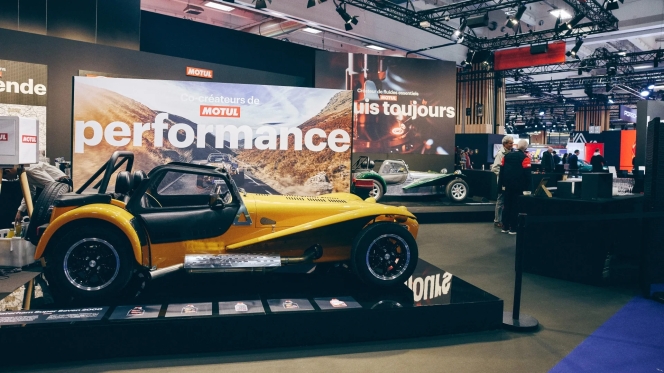
Caterham and Motul have solidified their ongoing collaboration with a new long-term agreement, blending Caterham’s focus on lightweight sports cars with Motul’s extensive expertise in advanced lubrication, honed over more than a century and a half. The alliance was celebrated publicly at Rétromobile 2026 in Paris, where a 2005 K-Series and a 2025 Super Seven 2000 were displayed on Motul’s stand. Under the renewed partnership, every new Caterham Seven produced at the company’s Dartford headquarters will leave the factory using Motul lubricants, spanning all models from the road-going 170 to each race car competing in the five Caterham Motorsport UK Championships.
Further deepening the relationship, Motul will take on the role of title sponsor for the Caterham Seven Championship UK in 2026, the brand’s premier national racing series. Known globally for its high-performance, motorsport-oriented fluid solutions, Motul brings decades of experience supporting automotive reliability and competitive success. Its technical innovation and research capabilities, proven through partnerships with major events like the 24 Hours of Le Mans and the Dakar Rally, ensure that its products meet the most demanding requirements, making Motul a natural and strategic partner for Caterham’s engineering and racing ambitions.
Ali McColl, Global Head of Marketing, Caterham, said, “This partnership is a significant milestone for Caterham, aligning our brand with a world-renowned leader in lubricants and fluid technology, reinforcing our commitment to performance across both our road and race cars. Motul brings a depth of experience in performance and efficiency that few other partners can offer. This agreement also marks an exciting new chapter for Caterham Motorsport. As we look ahead to the 2026 season, we are proud to unveil the Motul Caterham Seven Championship UK as the new name for the pinnacle of Caterham racing in the UK.”
Andreea Culcea, Chief Brand & Communication Officer, Motul, said, “We are proud to renew our partnership with Caterham, a brand renowned for its exceptional sports car expertise. Since 2019, our collaboration has been driven by shared values of performance, craft and precision. At Motul, we are developing tailor-made solutions designed to unlock the full potential of our partners’ machines. Working alongside a manufacturer like Caterham, where hand-crafted, limited-production cars are born from deep engineering know-how and passion, reflects our vision of authentic partnerships.”
- January 2026
- sales
- Hero MotoCorp
- TVS Motor Company
- Royal Enfield
- B Govindarajan
- Eicher Motors
- Mahindra & Mahindra
- Tata Motors Passenger Vehicles
- Hyundai Motor India
- Toyota Kirloskar Motor
- JSW MG Motor India
- Kia India
- Tarun Garg
- Nalinikanth Gollagunta
- Atul Sood
- Tata Motors Commercial Vehicles
Indian Automotive Sector Starts 2026 With Robust January Wholesales Growth
- By MT Bureau
- February 01, 2026

The Indian automotive industry has commenced the 2026 calendar year on a high note, with automakers across two-wheeler, passenger vehicle and commercial vehicle segments reporting significant YoY wholesale growth for January. The performance reflects a resilient domestic market and a burgeoning recovery in international exports.
The two-wheeler sector saw massive volume gains, spearheaded by Hero MotoCorp, which recorded dispatches of 557,871 units, marking a robust 26 percent growth compared to 442,873 units in January 2025. This performance marks the company’s 25th consecutive year of market leadership. TVS Motor Company followed with a 30 percent increase in domestic two-wheeler sales, reaching 383,262 units, while its electric vehicle (EV) wing grew by 50 percent to 37,756 units.
Royal Enfield achieved a significant milestone, surpassing 1 million year-to-date sales in just 10 months, posting January sales of 104,322 motorcycles – a 14 percent YoY increase, which includes 93,781 units in the domestic market and 10,541 units exported.
B. Govindarajan, Managing Director, Eicher Motors and CEO, Royal Enfield, said, "The new year has begun on a positive note for Royal Enfield – extending the strong momentum from the previous quarter and marking four consecutive months of healthy double-digit growth. We have crossed 1 million motorcycle sales in this financial year across the globe and also crossed 100,000 motorcycle sales in exports."
In the passenger vehicle (PV) segment, Mahindra & Mahindra reported a 25 percent growth in utility vehicles, selling 63,510 units domestically. Tata Motors Passenger Vehicles saw a dramatic 47.1 percent rise in total sales (including EVs) to 71,066 units.
Hyundai Motor India achieved its highest-ever monthly domestic sales of 59,107 units, up 9.5 percent, while Toyota Kirloskar Motor registered 30,630 units, representing a 17 percent YoY growth. Kia India also started the year strong with 27,603 units, a 10.3 percent increase and JSW MG Motor India grew 9 percent with 4,843 wholesale units.
Honda Cars India reported domestic wholesales of 6,193 units and 748 units in exports. These figures follow a January 2025 performance where the company registered 7,325 domestic units and 4,979 units in exports.
The current sales volume is supported by demand for the Honda Amaze, alongside steady contributions from the City and Elevate models.
Tarun Garg, MD & CEO, Hyundai Motor India, said, "January 2026 marks a defining chapter in Hyundai Motor India’s journey. Achieving our highest-ever monthly domestic sales of 59,107 units... reflects not only Hyundai’s brand leadership but also the collective strength of our people, partners and customers."
Nalinikanth Gollagunta, CEO, Automotive Division, Mahindra & Mahindra, said, "Building on the strong momentum of last year's performance, we began the year on a strong note in January... On 14th January, we opened bookings for XUV7XO and XEV 9S clocking 93,689 bookings for a booking value of INR 205 billion - a record-breaking milestone in just 4 hours."
Atul Sood, Senior Vice-President, Sales & Marketing, Kia India, said, "The encouraging start to 2026 reflects the continued trust customers place in the Kia brand. The positive response to the new-generation Seltos, steady demand for the Sonet, and growing popularity of the Carens Clavis and Clavis EV, underline the strength and balance of our portfolio."
Kunal Behl, Vice President, Marketing & Sales, Honda Cars India Ltd, said: “The year has begun on a strong note, supported by a healthy sales momentum. The Honda Amaze continues to bring in strong demand for its value for money offering along with the City and Elevate that contribute steadily to the overall business. We remain confident of sustaining this positive momentum in the coming months.”
The commercial vehicle (CV) sector also demonstrated strength, particularly in heavy and light cargo segments. Tata Motors reported total CV sales of 38,844 units, up 29.1 percent from 30,083 units in the previous year. Within this, Heavy Commercial Vehicle (HCV) trucks saw the sharpest rise at 41.2 percent. Mahindra’s domestic CV sales grew by 22 percent to 27,656 units, driven largely by the LCV 2T–3.5T category.
Union Budget 2026-27: Supply Chain Resilience, Infra Push To Drive Auto Industry Growth
- By MT Bureau
- February 01, 2026
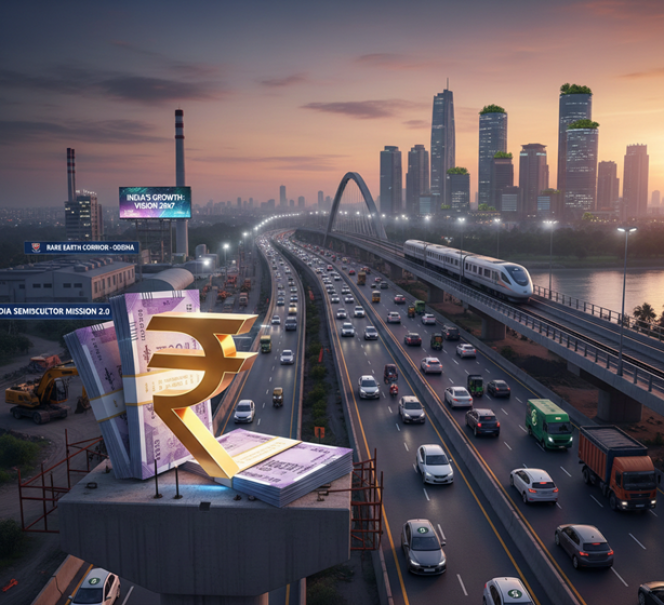
In a strategic pivot from direct consumer subsidies to foundational supply-chain resilience, the 2026-27 Union Budget, presented by Finance Minister Nirmala Sitharaman, focuses on bolstering the structural integrity of the Indian automobile industry.
A cornerstone of this year’s fiscal policy is the massive infrastructure and logistics push, highlighted by the development of the Dankuni-Surat Dedicated Freight Corridor and the operationalisation of 20 new national waterways. These initiatives, alongside a coastal cargo promotion scheme aiming to double the share of waterway freight to 12 percent by 2047, are designed to drastically lower logistics costs and ease the movement of components across the country.
Simultaneously, the government is reinforcing the industry's backbone by establishing a INR 100 billion SME Growth Fund to provide long-term capital for auto-component MSMEs, while enhancing liquidity through the Trade Receivables Discounting System (TReDS) and easing regulatory hurdles via ‘Corporate Mitras’ in Tier-II and Tier-III cities.
To secure the future of high-tech mobility, the Budget further expands the India Semiconductor Mission (ISM 2.0) to include domestic equipment manufacturing and chip IP, while nearly doubling the allocation for the Electronics Components Manufacturing Scheme to INR 400 billion. This technological drive is matched by a robust commitment to the electric vehicle (EV) ecosystem, specifically through the creation of ‘rare earth corridors’ in Odisha, Kerala, Andhra Pradesh and Tamil Nadu. These hubs will provide plug-and-play ecosystems to insulate the industry from global mineral volatility and supply curbs. Complementing this is a series of customs duty exemptions on capital goods used for lithium-ion cell manufacturing and critical mineral processing, which is expected to drive down battery costs and encourage local gigafactory expansion. Finally, for the clean energy segment, the full excise duty exemption on the biogas portion of blended CNG offers immediate relief to fuel prices, marking a comprehensive effort to foster a self-reliant, sustainable, and cost-competitive automotive landscape in the wake of previous GST reforms.
Motul Charts Future Of Mobility With Advanced Fluids At SIAT Expo 2026
- By MT Bureau
- January 31, 2026
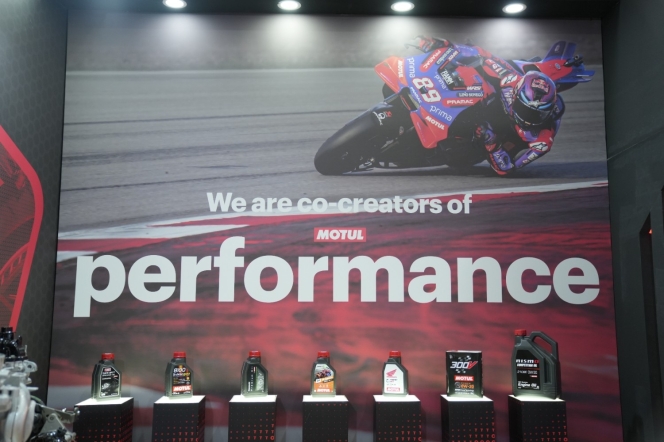
Motul India presented a comprehensive vision for the future of automotive fluids at SIAT Expo 2026, centred on innovation, sustainability and supporting the industry’s technological transition. The company’s exhibition was built around the event’s core theme of pioneering safe and sustainable mobility, demonstrating a strategic commitment to evolving alongside new vehicle architectures.
A cornerstone of this vision is the development of fluids for new propulsion systems. A keynote address by Dr Julien Plet, Global Head of R&D, elaborated on the critical role of innovative fluids for next-generation mobility. The company showcased its E-Gen series, engineered for the thermal management of electric vehicle components like motors, batteries and power electronics, positioning it as a critical solution for evolving electrified mobility. Simultaneously, for alternative fuels, Motul presented specialised lubricant formulations for hydrogen internal combustion engines, reflecting early and active research into diverse energy sources. This dual focus underscores a readiness to support the industry’s broad technological transition.
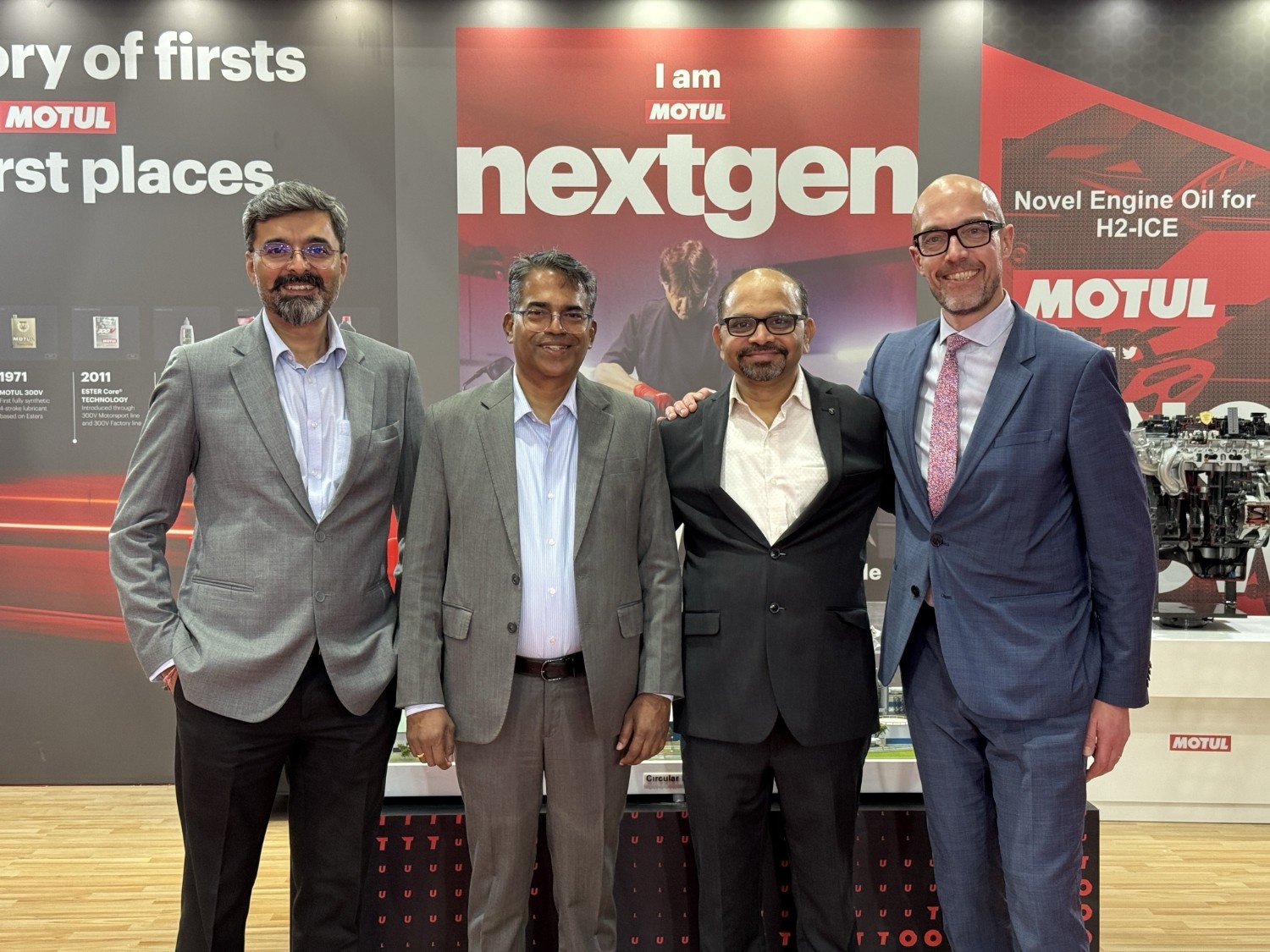
Further solidifying its technical credibility, Motul emphasised its race-to-road development philosophy. The exhibit featured OEM-validated products, including a lubricant with formal Mercedes-Benz approval and another born from collaboration with Toyota Racing Development. These examples illustrate how the company leverages the extreme demands of motorsport as a dynamic proving ground for future commercial technologies, rather than for immediate market launch.
Integral to its presentation was a strong sustainability narrative, exemplified by the NGEN lubricant range. This product line utilises base oils derived from re-refined materials, embodying circular economy principles and a long-term commitment to reducing environmental impact through responsible resource use.
Ultimately, by participating in the expo, Motul India reinforced its role as an innovation-led partner to the automotive ecosystem. With a robust global research backbone and deep industry relationships, the company showcased its structured approach to developing high-performance, sustainable fluids tailored to meet the specific demands of the Indian market as it advances.
Dr Plet said, “Motul’s research and development teams across geographies continue to focus on advancing lubricant performance for existing powertrains while developing technologies aligned with future mobility needs and local market conditions.”
Nagendra Pai, CEO, Motul India & South Asia, said, ‘’SIAT Expo is a key platform for future mobility, and Motul is proud to showcase its global innovation strength in India. By combining advanced technologies with local adaptability, Motul is ready to lead solutions across electrification, sustainability and alternative fuels.”







Comments (0)
ADD COMMENT